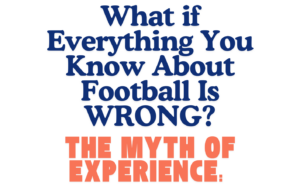The Myth of Experience: When Football Becomes Repetition (and How to Turn It into Evolution) (Part I)
– What is experience? How much experience does each coach have?
– Well, the number of years they’ve been coaching, right?
– Let’s change professions for a moment. A postman who is responsible for placing stamps on letters starts his first year on the job. He has a pile of letters to his right and stamps to his left. He picks up a letter, grabs a stamp, and sticks it on. He does this for an entire year. At the beginning of his second year, he changes his approach: first, he stacks the letters on top of each other, leaving a space where each stamp will go. Once they are all arranged, he places the stamps. In his third year, he realizes that if he positions them diagonally, he can work even faster. And so, over his 30-year career, he continuously refines his method.
– How many years of experience do you think he has?
– Well, 30 years.
– Now, let’s consider another postman. He also has a pile of letters to his right and stamps to his left. He picks up a letter, grabs a stamp, and sticks it on. He repeats this exact process every single day for 30 years. He performs the same task, in the same way, without change.
– How many years of experience do you think he has?
– 30 years.
-The first postman has 30 years of experience, but the second has one year of experience repeated 30 times.
This was one of my first conversations with Rafa Benítez.
The Spanish comedian and philosopher Perich once said: “Experience teaches us that experience is useless.“ I used this quote in coaching courses for the Real Madrid Football Federation to explain to coaches that nothing in their “backpacks” should be repeated mechanically throughout their careers. Everything we do with our teams—whether in the first year or years later—must be examined and questioned. We must reflect on why we behave a certain way as coaches, fitness trainers, physiotherapists…
As coaches, there comes a point in our careers when we achieve success. For some, it lasts a season; for others, several seasons or a specific moment. These successes allow us to grow, move to higher-level teams, earn better salaries, and have the chance to win titles.
This success often makes us slaves to our “successful experience,” leading us to repeat what we did with our winning team wherever we go. This is the first mistake that leads to future dismissals.
Luis Enrique, after the match against Liverpool in the Champions League, stated that experience had shown him that it wasn’t necessary to prepare for penalty shootouts in the knockout stage against the English team.
But was it truly experience that taught him this, or was it analysis and knowledge added to his past experiences in other knockout matches?
If he had relied solely on his experience and Spain had won their World Cup knockout match against Morocco after preparing for penalties, would he then have trained for penalties in that Champions League tie?
I believe he would have—because we are slaves to our “successful experience.” But that wasn’t the case in the past, and it made him reflect, incorporate knowledge from other areas, listen to his staff (I believe Joaquín Valdés played a key role), and ultimately decide that preparing for a penalty shootout wasn’t the most important factor in a knockout match.
Some might ask: When do they practice penalties, then?
There are many opportunities throughout the season to work on penalties without waiting until the eve of a knockout match. For example, using penalty shootouts to decide a winner in training matches that end in a draw, giving multiple players the chance to take penalties after training, and adding a “penalty” or consequence to simulate competition pressure.
My goal with this article wasn’t to talk about Luis Enrique—it was to discuss experience. How our “successful experience” leads us to repeat the past without analyzing it or recognizing mistakes, while we scrutinize our negative experiences and, 99.9% of the time, change them—even though we might not necessarily be wrong.
What we, as coaches, must understand is that success or failure is not determined by winning or losing. Football is influenced by numerous factors, many of which are beyond our control. What is within our control is setting objectives and working towards them—objectives that depend on us—making decisions based on the right knowledge, relying on the people around us who have different perspectives, and being prepared to make mistakes—because we will make mistakes.
And one last thing: document, write, analyze… these mistakes.
Have a plan. Be ready to make mistakes. Analyze and document those mistakes.
To be continued…
Want more insights on football training and tactics? ⚽🔥
📲 Follow me on Instagram for exclusive content, practical tips, and in-depth discussions: @alexdorateam
🔗 Read more articles here! 🚀

